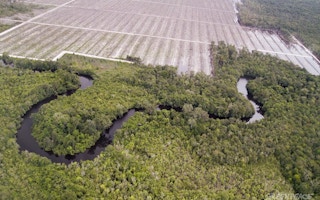Indonesia has blamed eight companies, including Singapore-based Sinar Mas and Asia Pacific Resources International (APRIL) for the fires raging across its land of Sumatra that has blanketed parts of Malaysia and parts of Singapore in its most severe haze in history.
To continue reading, subscribe to Eco‑Business.
There's something for everyone. We offer a range of subscription plans.
- Access our stories and receive our Insights Weekly newsletter with the free EB Member plan.
- Unlock unlimited access to our content and archive with EB Circle.
- Publish your content with EB Premium.
Senior presidential aide Kuntoro Mangkusubroto was reported by news wires on Friday saying: “The majority of hotspots in Riau (province) are inside APRIL and Sinar Mas concessions,”
The environment minister said not all eight companies were Singapore based, but declined to name the rest of them. He added that investigations are still ongoing and he was not able to elaborate further where these companies are from, although Indonesia is expected to name the companies in the next few days.
Indonesian Environment Minister Balthasar Kambuaya met his counterpart from Singapore, Dr Vivian Balakrishnan in Jakarta on Friday, who handed a letter from Prime Minister Lee Hsien Loong to the Indonesian President Susilo Bambang Yudhoyono.
Dr Balakrishnan had earlier in the week called on Indonesia to name and shame the companies so that commercial pressure can be applied on them to prevent and address the haze.
Some of the world’s major largest palm oil companies such as Singapore-based Wilmar International and Malaysia-based Sime Darby have denied involvement in the burning, although Wilmar has been reported to say it cannot control local practices of slash-and-burn for agricultural and other purposes.
Others such as Sinar Mas unit, Asia Pulp and Paper, had pledged to stop clearing natural forests within its concessions back in February. Its sister palm oil company, Golden Agri-Resources, had also committed to forest conservation after being the target of campaigns by environmental groups such as Greenpeace for its involvement in forest clearing and burning in the past.
It is not yet clear if they are directly involved in the latest forest clearing activities that is causing the regional smog.
Greenpeace said on Thursday that half the fires hotspots that are causing the severe haze are in areas that should be protected by Indonesia’s forest moratorium.
President Yudhoyono had recently extended the country’s forest moratorium, which aims to prevent new clearing of primary forests and peat lands for another two years.








